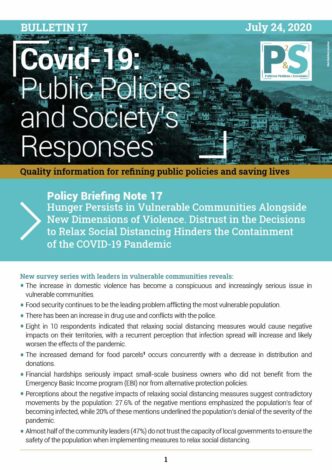New survey series with leaders in vulnerable communities reveals:
- The increase in domestic violence has become a conspicuous and increasingly serious issue in vulnerable communities.
- Food security continues to be the leading problem afflicting the most vulnerable population.
- There has been an increase in drug use and conflicts with the police.
- Eight in 10 respondents indicated that relaxing social distancing measures would cause negative impacts on their territories, with a recurrent perception that infection spread will increase and likely worsen the effects of the pandemic.
- The increased demand for food parcels1 occurs concurrently with a decrease in distribution and donations.
- Financial hardships seriously impact small-scale business owners who did not benefit from the Emergency Basic Income program (EBI) nor from alternative protection policies.
- Perceptions about the negative impacts of relaxing social distancing measures suggest contradictory movements by the population: 27.6% of the negative mentions emphasized the population’s fear of becoming infected, while 20% of these mentions underlined the population’s denial of the severity of the pandemic.
- Almost half of the community leaders (47%) do not trust the capacity of local governments to ensure the safety of the population when implementing measures to relax social distancing.
Work group responsible
Coordination: Graziela Castello (CEBRAP), Priscila Vieira (CEBRAP) e Monise Picanço (CEBRAP)
Researchers:
- Dafny Almeida (CEBRAP)
- Daniela Costanzo (CEBRAP)
- Jaciane Milanezi (CEBRAP)
- Jonatas Mendonça dos Santos (USP)
- Laura Simões (USP)
- Leonardo Fontes (CEBRAP)
- Rodrigo Brandão (USP)


